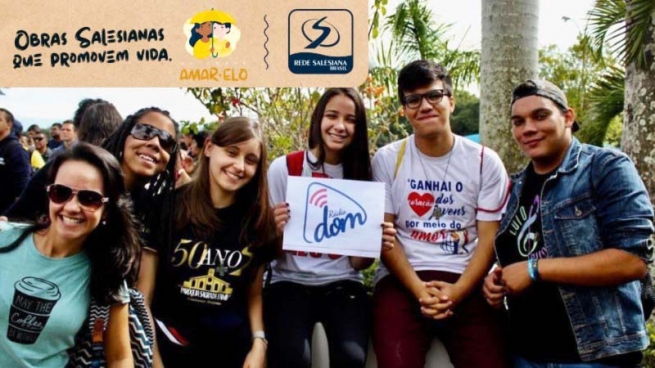BRAZIL: Rádio Dom provides youth in detention centers an opportunity to learn a skill and have their voices heard

(MissionNewswire) Rádio Dom (Radio Don Bosco) is an online radio station that was established by Salesian missionaries and students in 2017 in Curitiba, Brazil. Youth produce the majority of the content that is aired. In the first two months of broadcasting, 15 programs were launched and a loyal audience of more than 10,000 listeners was reached. In August 2018, the station rebranded to Rádio Dom, which refers to Don Bosco (called Dom Bosco in Brazil).
Rádio Dom is an integral part of the Salesian communication network of Brazil and is maintained in association with Vatican Radio and other broadcasters. Today, Rádio Dom has expanded to 20 programs, has an audience of more than 150,000 listeners and has recently joined the Brazil Salesian Network of Social Action. With more than 45 volunteers, including speakers, journalists, technicians and planners, Rádio Dom produces informative programming, education and music. The radio’s web platform has received over a million hits.
The radio station has six studios in two Brazilian states, including three located in detention units for youth in conflict with the law. In collaboration with the Salesian University Center of Sao Paulo (UNISAL), Rádio Dom has also given hope and support to youth in detention centers. Youth have been able to express themselves, learn a skill and show people they are more than the petty crimes they have committed. Additional programs to support these youth have grown from efforts at Rádio Dom.
“The radio station is yet another avenue to reach youth and promote hope through education and social development,” said Father Gus Baek, director of Salesian Missions, the U.S. development arm of the Salesians of Don Bosco. “Students working at the station also have a chance to have hands-on work experience and gain the skills necessary for long-term stable employment.”
Salesian missionaries in Brazil provide education, workforce development and social services throughout the country. They specifically focus on children with disabilities within several programs. Missionaries help to meet the basic needs of poor youth, including street children, and provide them with an education and life skills to gain employment, break the cycle of poverty and lead productive lives.
The World Bank estimates that about 28.6 million Brazilians moved out of poverty between 2004 and 2014. But from the start of 2016 to the end of 2017, the World Bank estimates that 2.5 million to 3.6 million fell back below the poverty line earning less than 140 Brazilian reais per month. Economists blame high unemployment, near 13 percent, and cuts to key social welfare programs for challenges in the country.
Issues of income inequality and social exclusion remain the root causes for those in poverty. Inequalities also exist in access to education and educational efficiency. These inequalities are greatest for children and youth who are poor, live in rural areas, or who have an incomplete compulsory education. Salesians working with poor youth and their families in Brazil develop programs and provide youth with opportunities for furthering their education and skills.
###
Sources:
ANS Photo (usage permissions and guidelines must be requested from ANS)
ANS – Brazil – “Rádio Dom” joins “Brazil Salesian Network of Social Action”
Salesian University Center of Sao Paulo (UNISAL)
Salesian University Center of Sao Paulo (UNISAL) Facebook
World Bank – Brazil





